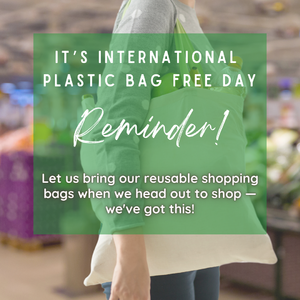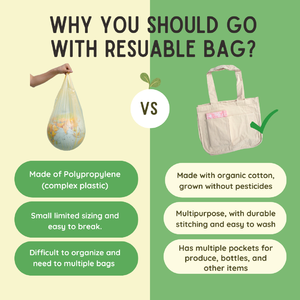By Wendy Chua of Plantish Future

Introduction[edit | edit source]
Plastic bags are a big part of our everyday lives, making it easy to carry everything we buy from grocery stores, markets, and other stores. But their importance goes beyond just being durable and flexible. They also impact the environment, the economy, and human health.
Every year, the world goes through over 5 trillion plastic bags—that's 160,000 bags used every second! Massively using single-use plastic bags creates enormous environmental and human health problems.
This article will explore the negative impacts of single-use plastic bags, discuss the initiatives behind International Plastic Bag Free day, and discuss the benefits of opting for reusable grocery bags.
Impacts of Single-Use Plastic Bag[edit | edit source]
1. Environmental Impacts[edit | edit source]
Single-use plastic bags usually end up in landfills, where they don't decompose but instead photodegrade. Plastic breaks down into tiny pieces called microplastics, which can hang around for 500 to 1,000 years. These microplastics contaminate the soil, air, and waterways. While everything else eventually decomposes, plastic sticks around.
Many plastic bags end up in the ocean, about 10 per cent of 100 million tons of plastic yearly, seriously harming marine life. Sea turtles, birds, and fish often eat these plastics, making them sick or even killing them.
According to the Ocean Conservancy, plastic bags are among the top items found during beach cleanups. The ocean is a significant food source, feeding about 3 billion people, roughly 40% of the world's population. So, these marine animals often end up on our plates, so healthy marine life makes them safer for human consumption.
Some plastic bags get littered, making city streets and natural spots look unpleasant and hurting tourism. Municipalities spend millions annually cleaning up plastic bag litter, which can block drainage systems and cause flooding during heavy rains.
The production of plastic bags relies on petroleum, a non-renewable resource. The extraction and processing of petroleum for plastic manufacturing contribute to greenhouse gas emissions and environmental degradation. Greenhouse gas emissions contribute to the greenhouse effect, leading to global warming and climate change.
2. Economy of Coastal Communities[edit | edit source]
Many coastal communities depend their livelihood on the sea for fishing, tourism, and maritime trade. The economic effect of plastic pollution primarily hits them. Plastic trash on beaches can put off tourists, and the fishing industry suffers because of the loss of marine life and the contamination of fish stocks. Moreover, the effects of climate change, including rising sea levels and more frequent extreme weather events, pose significant threats to coastal communities.
3. Human and Health[edit | edit source]
Plastic bags are not just an environmental nuisance; they also pose significant health risks to humans. The production and breakdown of plastic bags release harmful chemicals, such as bisphenol A (BPA) and phthalates, which can leach into food and water supplies. Humans can inhale these chemicals through air.
BPA is an industrial chemical used to produce certain plastics and resins. It is known to act like estrogen, the hormone that regulates many of our body's processes. It affects the human endocrine system and causes hormonal imbalances.
Studies have shown that BPA exposure might increase the risk of breast and prostate cancers. BPA may interfere with hormones and could contribute to cancer development. It has been linked to reproductive problems, including lower fertility and developmental issues in fetuses and kids.
Phthalates are chemicals that make plastics more flexible and sturdier. You'll find them in plastic bags, toys, vinyl flooring, and personal care products. Like BPA, phthalates can mess with your hormones and affect your reproductive system. There's evidence they might contribute to health issues like obesity, diabetes, and heart disease. They've also been linked to developmental problems in kids, including behavioral issues and lower IQ scores.
History and Origin of International Plastic-Bag Free Day[edit | edit source]
The initiative was started by Zero Waste Europe, a non-profit organization that advocates for a zero-waste lifestyle, which seeks to eliminate plastic pollution and foster a global movement towards plastic-free communities.
To combat this issue, Zero Waste Europe and the Break Free From Plastic movement sought to create a dedicated day to raise awareness about the problems associated with plastic bags and to inspire action toward sustainable solutions. It is observed annually on July 3rd.
Since its inception, International Plastic Bag Free Day has gained momentum and support from individuals, environmental organizations, and governments worldwide. The day serves as a reminder of the urgent need to address plastic pollution and encourages collective efforts to create a cleaner, healthier planet.
Goals and Activities[edit | edit source]
The primary goals of International Plastic Bag Free Day are to:
- Reduce Plastic Bag Use - Encourage individuals to refuse single-use plastic bags and opt for reusable alternatives such as cloth or paper bags.
- Raise Awareness- Educate the public about the environmental and health impacts of plastic bags.
- Promote Policy Change - Advocate for governmental policies that ban or restrict the use of plastic bags, and support sustainable practices.
- Engage Communities - Inspire community actions and initiatives that reduce plastic bag usage and promote sustainability.
Ways to Participate[edit | edit source]
People can participate in International Plastic Bag Free Day by:
- Using reusable shopping or bags for shopping and daily activities.
- Organizing or participating in clean-up drives to remove plastic bags from natural environments.
- Educating friends, family, and the community about the impact of plastic bags.
- Supporting businesses and brands that commit to reducing plastic bag usage.
- Advocating for local policies that ban or limit the use of single-use plastic bags.
By taking part in these activities, individuals and communities can contribute to a larger movement towards a healthier, plastic-free environment.
The Benefits of Reusable Shopping Bags[edit | edit source]
Reusable shopping bags comes with are more than just a way to carry your groceries. They play a key role in promoting environmental sustainability, saving money, and shaping consumer habits. Here’s why they’re so important:

1. Environmental Impact[edit | edit source]
Using reusable shopping bags can make a big difference for the environment. Unlike single-use plastic bags that contribute to pollution and waste, sustainable alternatives like reusable, biodegradable, or recyclable bags help reduce our environmental footprint. Every time you opt for a reusable bag, you’re cutting down on the number of plastic bags that end up in landfills and oceans.
2. Economic Benefits[edit | edit source]
While reusable bags might cost more upfront, they can save money in the long run. Businesses spend a lot on packaging, and these costs often get passed down to consumers. By switching to reusable bags, you can reduce the need for continuous production and disposal of single-use bags, leading to cost savings over time.
3. Influencing Consumer Behavior[edit | edit source]
The type of shopping bags we use can influence our behavior and awareness about environmental issues. When stores and consumers choose sustainable bags, it helps spread awareness and encourages eco-friendly practices. This can lead to a broader cultural shift towards sustainability and responsible consumption.
Types of Sustainable Shopping Bags[edit | edit source]
Choosing the right type of reusable shopping or grocery bag depends on your specific needs and preferences. These bags not only help reduce plastic waste but also provide a more durable and often more convenient alternative for carrying groceries and other items. Here are the different typesː
- Tote Bags - Versatile, often made from various materials like cotton, canvas, or synthetic fibers. Great for shopping, daily activities, and work.
- Cotton Bags - Made from organic or conventional cotton, which is durable, washable, biodegradable, and eco-friendly. Ideal for groceries and everyday shopping.
- Canvas Bags - Made from heavy-duty canvas material, very sturdy, long-lasting, and washable. Suitable for groceries, books, and heavy items.
- Jute Bags - Made from natural jute fibers, which is eco-friendly, biodegradable, strong, and often stylish. Good for Groceries, shopping, and gift bags.
- Hemp Bags - Made from hemp fibers, which is strong, sustainable, biodegradable, and naturally resistant to mold and UV light. Great for groceries, shopping, and casual outings.
- Nylon Bags - Made from lightweight nylon material that is Lightweight, foldable, easy to carry, and washable. Suitable for Groceries, shopping, and travel.
- Polyester Bags - Made from polyester fabric, which is durable, washable, often water-resistant, and available in many designs. Good for Groceries, shopping, and travel.
- Recycled Plastic Bags - Made from recycled plastic materials, such as PET bottles which helpful in reduces plastic waste. It is durable, and washable. Suitable for Groceries, shopping, and everyday use.
- Mesh Bags - Made from mesh material, often cotton or synthetic that is breathable, lightweight, washable, and perfect for fresh produce. Good for produce, beach trips, and laundry.
- Insulated Bags or Cooler Bags - Made with insulating materials to keep items hot or cold for extended periods. Great for perishables like dairy, meats, and frozen foods.
Let's Celebrate Plastic Bag Free Day and Beyond![edit | edit source]
Choosing reusable shopping bags is a small change that can have a big impact on the environment, the economy, and consumer habits. So next time you head to the store, remember to bring your reusable bag and make a positive difference!
External Sources / Referencesː[edit | edit source]
- Plantish Future
- Zero Waste Europe
- The World Counts
- Ocean Conservancy
- Ocean Literacy UNESCO
- UN Environment Programme
- Marine Debris Program
- Greenpeace
- National Institute of Environmental Health Sciences
- Environmental Health Perspectives – BPA and Health
- World Bank – Coastal Communities and Climate Change
- WWF – The Effects of Climate Change on Coastal Communities
- Mayo Clinic - BPA: Exposure, effects, and measures
- National Institute of Environmental Health Sciences - BPA
- National Institutes of Health - Phthalates and Health
- ScienceDirect - Microplastics and Chemical Leaching
- World Health Organization - Microplastics in Drinking Water
- National Geographic – How Plastic Degrade
- Scientific American - The Plastic Breakdown
- European Union - Single-Use Plastics Directive
- Government of Canada - Single-Use Plastics Prohibition Regulations
- UK Government - Ban on single-use plastic straws, stirrers, and cotton buds
- Australia - Single-use plastics ban
- New York State Plastic Bag Waste Reduction Law
Small Changes, Big Impact: Celebrate International Plastic Bag Free Day © 2024 by Wendy Chua is licensed under Creative Commons Attribution-ShareAlike 4.0 International